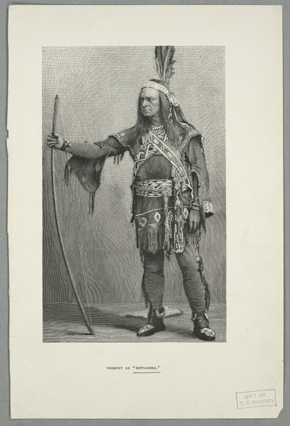Travel by Water and Road

Engraving by T. Johnson after a photograph by Mathew Brady, ca. 1859
The New York Public Library for the Performing Arts, Billy Rose Theatre Collection
"OCEANA: High on a craggy rock an Indian stood, with sinewy arm and
eye that pierced the glen. His bowstring drawn to wing a second
death, his robe of fur was o'er his shoulder thrown, and o'er his
long, dark hair an eagle's plume waved in the breeze, a feathery
diadem. Firmly he stood upon the jutting height, as if a
sculptor's hand had carved him there. With awe I gazed as on the
cliff he turned -- the grandest model of a mighty man.
WALTER: 'Twas Haups' great chieftain, Metamora called; our people
love him not, nor is it strange; he stands between them and
extended sway, ready alike with words of power to urge, or
gleaming weapons to force his princely dues…
OCEANA: Behold his dread encounter with a wolf. His vanquished
foe with mighty arm he hurls down the steep height where mortal
never trod…
WALTER: (at Metamora's exit) 'Tis Metamora, the noble
sachem of a valiant race -- the white man's dread, the Wampanoag's
hope."
— John Augustus Stone, Metamora (1829) Act I, sc. 1
For many years, Forrest starred as Metamora, the leader forced to
abandon his land to save his people. The power of Forrest's acting
was analyzed by T. S. Fay, writing from London for the The
New-York Mirror (Dec. 10, 1836) "From our Foreign
Correspondents: Forrest in London":
"Forrest is achieving an English as well as an American
immortality… the British criticks [sic] deal out their
commendations with no timid hands. They are not afraid to praise
too much any more than too little. 'Tremendous power,' 'startling
scenes,' 'a continual blaze of genius,' 'a rough but powerful
energy that wins upon the audience as they become better
acquainted with it.' These and other equally unequivocal and
enthsiastick [sic] phrases go the rounds of the newspapers, from
the leading journals downward. His simplicity, sincerity and
energy are particularly liked, and they think he possesses nature
unenervated [sic] by artifice; in short, that his style resembles
a full and bounding river, sweeping on its course through an
American forest and carrying away the obstacles which lie in its
path…"